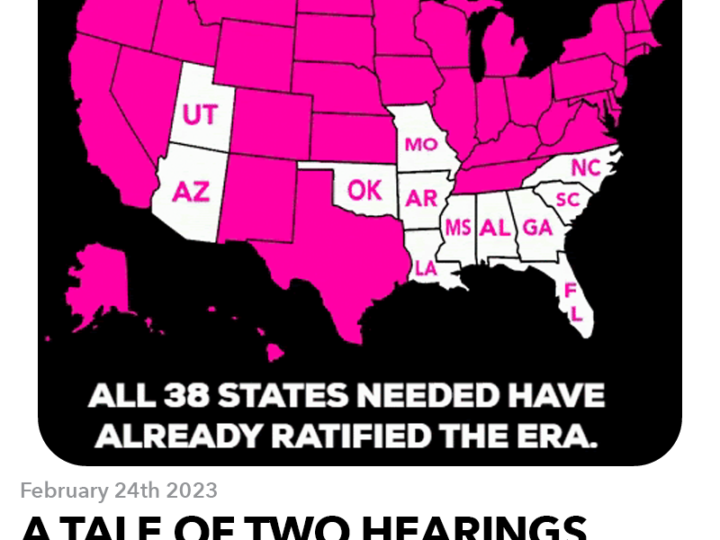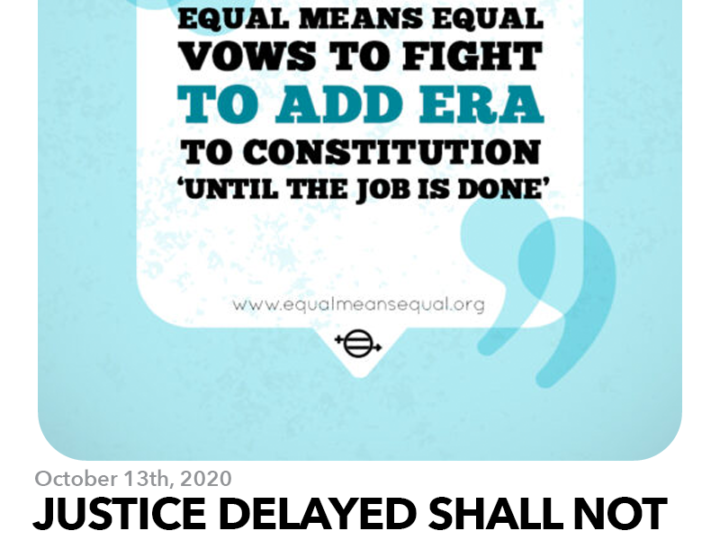The E.R.A. was dealt a blow in a Washington D.C. Federal Court on Friday when federal district court judge Rudolph Contreras ruled against the Attorneys General of Virginia, Illinois, and Nevada in their case to uphold ERA ratification…. but the matter is far from dead. We believe the First District will overturn the previous court’s decision in Equal Means Equal’s case and we will ultimately win in the Supreme Court of the United States.
Here is what our attorney, Wendy Murphy, had to say about the recent ruling in the D.C. ERA Case:
“Judge Rudolph Contreras’ decision paid no mind whatsoever to women’s suffering – and meandered needlessly into areas of law that could have been avoided, in order to justify the end result.
Here’s how we know Judge Contreras’ ruling was unnecessary, and why he easily could have upheld the ERA.
Judge Contreras had to determine whether the ERA’s ratification deadline was constitutionally valid. ERA supporters argued the deadline was not valid because it was placed in the ERA’s preamble (introductory section) rather than the text of the amendment itself. The answer is important because Congress only recently started putting deadlines in preambles instead of text. So a key question for the court was whether Congress itself had doubts about placing a deadline in a preamble. If they did, then Judge Contreras could validate the ERA, but Judge Contreras said Congress had no doubts.
He was wrong.
Judge Contreras said Congress “did not expect that changing the location of a deadline [from the text of an amendment to its preamble] would affect the deadline’s effectiveness.” Op. p.31.
In fact, Congress did have doubts because no court had ever before ruled that Congress could place a deadline in a preamble. It was an issue of first impression for Judge Contreras, which meant he had enormous leeway in how he decided the issue because there was no binding precedent forcing him to rule a certain way. This is exactly the type of case where a judge’s values make a difference. A judge who sincerely believes that women deserve constitutional equality would have seized the opportunity to rule against the deadline and in favor of the ERA simply because no existing law or court ruling compelled him to rule otherwise.
Here are the facts Judge Contreras ignored – that he could have and should have relied on to rule that the ERA deadline is not valid because Congress was not confident that placing a deadline in a preamble was constitutional. Congress was concerned that doing so would affect the deadline’s effectiveness.
Imposition of ratification deadlines began relatively recently with the 18th Amendment in 1917, and have been imposed only a handful of times. Most of our amendments had no deadline at all. A deadline was imposed on the 18th but not the 19th Amendment. And the placement of deadlines has been inconsistent. Some were placed in preambles, while others were placed in the text.
When Congress was proposing to add a deadline to the preamble of the 20th Amendment in 1932, some members of Congress objected on the grounds that placing it in a preamble would be “of no avail” as it would not be “part of the proposed constitutional amendment.” 75 Cong. Rec. 3856 (1932). Congress thus placed deadlines only in the text of the next three amendments.
It was not until 1960 that Congress first placed a deadline in a preamble, claiming a need to “declutter” the text. But if decluttering the text were truly the goal (rather than limiting States’ rights by restricting the time they have to ratify) why would Congress have “cluttered” the text of the ERA with procedural matters such as delaying the ERA’s effective date for two years after ratification? It makes no sense that the States were able to vote on whether the ERA should have a two-year delay in enforcement after ratification, but States were not able to vote on whether their Article V rights should be restricted by a congressionally imposed ratification deadline.
As recently as 1978, Congress placed a deadline in the text and the preamble of an amendment, indicating they remain dubious about the constitutional legitimacy of placing deadlines in preambles. 92 Stat. 3795 (1978).
All these facts were excluded from Judge Contreras’ ruling killing the D.C. case last week.
Judge Contreras also disturbingly wrote that “if Congress can dictate the mode of ratification” in the preamble, “then it should be able to dictate a ratification deadline in the same fashion.” This statement makes no sense. “Mode of ratification” refers to whether the ratification process occurs by State conventions or State legislatures. Congress may dictate which of these modes is used because Article V of the Constitution explicitly gives Congress this power. Article V does not give Congress the power to restrict States’ rights by limiting the time they have to ratify an amendment. To the contrary, the Framers were clear that amendatory powers must be shared equally between the national and state governments and allowing Congress to dictate how long the States have to ratify an amendment is tantamount to giving Congress sole authority to decide when our Constitution is amended – in blatant derogation of Article V.
This was one of the most important women’s rights legal controversies ever, yet a judge who easily could have declared women fully equal persons declined to do so, and he based his decision on incorrect facts. His ruling prevented women from achieving equality and changed Article V by stripping the States of their vital right to participate in the amendatory process as equals. Maybe we shouldn’t be surprised that a judge willing to disregard women’s equal rights was willing to disregard States’ equal rights, too.”
– Wendy Murphy
We know it’s been a tough road, but we will not give up until equality of rights under the law is included in our United States Constitution. We will fight until the bitter end.
Sincerely,
Natalie, Kamala, Wendy, Thila and the entire EME Team worldwide.
PS: Your generous tax-deductible contributions are an investment in our results-driven organization on the frontlines of the fight for equality. Any amount is greatly appreciated, but for donations of $500 or more we’ll send you our exclusive (and very popular!) handmade Equal Means Equal hoodie as a special thank you.




